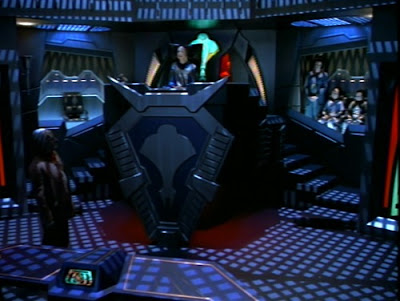There
has been much talk of “activist judges” on both sides of the political aisle
for years now, but in general, judges are supposed to be paragons of virtue:
impartial arbiters of the law who are above and beyond the vicissitudes and
passions of the moment and must consider law based on history, tradition, and our
obligation to a better, more equitable society in the future.
In
broad terms, judges are men and women who issue judgments about the law based
on knowledge, experience, and yes, personal interpretation. Except during political campaigns, judges are
generally held in high regard in Western society, as seems plain from both the superior
position of the bench in the courtroom -- high
above the lawyers and jury’s station -- and from standard judge’s garb,
traditionally black or red robes.
But
in cult television history, judges have not always been successful impartial
arbiters of law. Sometimes, in fact,
they have passed judgment in the most ruthless of ways, and with secret agendas.
The
alien who “judges” humanity, in fact, is a common trope in Gene Roddenberry’s Star
Trek universe. Star
Trek: The Next Generation (1987 – 1994) utilized the concept as its creative
book-end in the premiere episode “Encounter at Farpoint” and the series finale,
“All Good Things.”
In
both situations, the omnipotent Q (John De Lancie) brought Captain Picard
(Patrick Stewart) and his command crew to a 21st century legal
proceeding where Q acted as judge (and prospective executioner). The matter he judged: were humans a
grievously savage race, guilty of terrible crimes in the galaxy? Picard not only had to defend his crew, but
the human race, and even human history.
In
earlier Star Trek lore, another mischievous God-being, Trelane (William
Campbell) held court and passed judgment on Captain Kirk (William Shatner) in the
first season story “The Squire of Gothos.”
There, Trelane accused the good captain of conspiracy, treason and
fomenting insurrection, crimes which would see Kirk hang. Memorably, the specter of a noose hung over
Kirk as this judge prepared to rule against him.
On
Deep
Space Nine (1993 – 1999), Chief Miles O’Brien (Colm Meaney) had his own
run-in with a nasty judge: Makbar, the Archon on Cardassia Prime. In an episode reminiscent of Kafka’s The Trial,
O’Brien was held in the Cardassian legal system he couldn’t comprehend for a
crime he did not commit.
Space:
1999 (1975 –
1977) also featured some villainous judge characters. In “The Rules of Luton,” Moonbase
Alpha’s Commander John Koenig (Martin Landau) faced the cruel justice of the
Judges of Luton, three living trees (!) on a world populated by sentient
plants. Again, the idea here was of the
human race running afoul of indecipherable alien law and being judged by
standards not its own. In this case, the
Judges of Luton, like Trelane before them, were terribly brutal and believed
that ignorance of the law was no excuse for criminal behavior.
Koenig’s
crime? Along with Maya (Catherine
Schell), he picked a flower and sampled a berry. But on Luton, of course, those were the acts
of murderers…
On
Battlestar
Galactica (1978 – 1979), Commander Adama (Lorne Greene) once had to
briefly adopt the role of Judge for the Colonial Fleet when Starbuck (Dirk
Benedict) was accused of murdering Ortega, a competitor in the game of Triad. In the tradition of all drama set on terra firma, Judge Adama even spoke an
immortal line about a lawyer’s defense being “highly irregular.”
There
were at least a few episodes of Buck Rogers in the 25th Century
(1979 – 1981) in which judges were also seen.
In “Time of the Hawk,” Hawk (Thom Christopher) was tried for murder
before a council of cosmic judges, but thanks to Buck’s appearance as a
character witness, spared the death sentence.
Later in the same season, Buck was tried as a traitor himself in “Testimony
of a Traitor.”
Judges
have also appeared in far more grounded settings in cult-tv history. A panel of FBI higher-ups judged Mulder
(David Duchovny) during the finale of The X-Files, “The Truth,” and a
regular character on Picket Fences (1992 – 1996) was
Judge Henry Bone (Ray Walston), a man who --
in keeping with his name -- could feel
justice in his bones. Judge Bone was a
flawless legal and moral barometer, and always balanced the law perfectly.
We
have also met some unofficial and frightening judges in cult-tv history. In two second season episodes of Buffy
the Vampire Slayer (“Surprise” and “Innocence,”), Buffy (Sarah Michelle
Gellar) was forced to combat a fearsome blue skinned demon called “The Judge”
(Brian Thompson) who could separate the wicked from the righteous at a touch….literally
burning up the wicked.
One
of
Millennium’s (1996 – 1999) most memorable early episodes, “The Judge”
gazed closely at the idea of vigilantism in late-1990s America. There, a self-proclaimed “judge” (Marshall
Bell) set out to deliver his own brand of justice to those who had escaped the
reach of the law. When he was revealed
to be a hypocrite for his views on crime and punishment, the judge was punished
most egregiously. One of his own
enforcers fed him to his pigs. Importantly,
“the judge” did not die before offering Frank Black (Lance Henriksen) a job as
a vigilante enforcer. It was an offer that noble Black quite rightly turned
down…












Excellent John.
ReplyDeleteFurther, and I know this isn't one of your favorites in the world of SF, but Stargate SG-1 dipped into many of these themes along the way to good effect as well.
I suspect Stargate Atlantis, which I'm watching now, had its moments as well. cheers my friend - sff
Hi SFF,
DeleteI am almost through five seasons of Primeval -- a fantastic series -- and after that I'm looking to get into Sliders, at least first season, and Stargate SG:1. I really need to fill in those "gaps."
best,
John